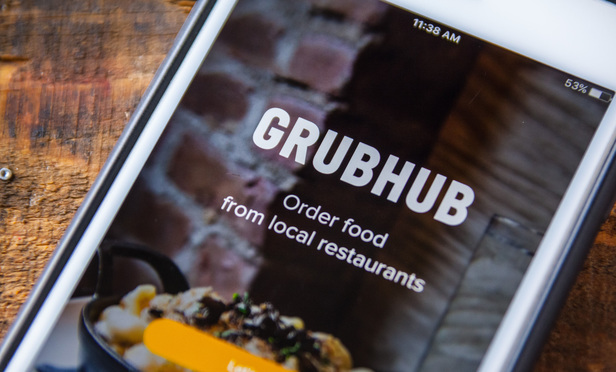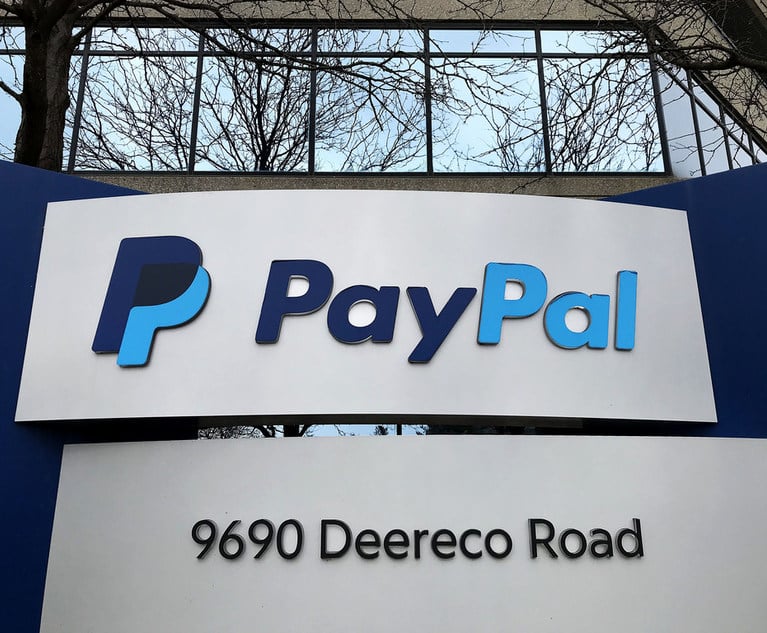At Trial's Close, GrubHub Faces a Skeptical Judge
A federal judge hinted she could rule that a Grubhub delivery driver should be treated as an employee rather than as an independent contractor.
October 30, 2017 at 09:03 PM
13 minute read
 SAN FRANCISCO—At the close of the first trial to tackle how workers should be classified in the “gig economy,” a federal judge Monday gave hints she's prepared to rule that a Grubhub driver should be treated like an employee.
SAN FRANCISCO—At the close of the first trial to tackle how workers should be classified in the “gig economy,” a federal judge Monday gave hints she's prepared to rule that a Grubhub driver should be treated like an employee.
Raef Lawson, who drove for the app-based food delivery service for roughly four months before being terminated in 2016, sued Grubhub alleging he was misclassified as an independent contractor. Although his suit began as a class action, it is now solely an individual case.
Lawson is seeking less than $600 for expense reimbursement, overtime and unpaid minimum wage. But the suit also includes a potentially higher-dollar claim brought under California's Private Attorneys General Act and has been seen as something of a bellwether for other gig-economy companies. Lawson is represented by plaintiffs attorney Shannon Liss-Riordan.
At closing arguments in the bench trial, U.S. Magistrate Judge Jacqueline Corley of the Northern District of California drilled down on the fact that Lawson's contract with Grubhub allowed him to be terminated at will—a factor she said California law gives heavy weight to in determining an employment relationship.
“It's one factor, but it's of 'inordinate importance,' so I think you have that heavy burden,” Corley said to Michele Maryott of Gibson, Dunn & Crutcher, who delivered Grubhub's closing arguments and handled much of the trial for the company.
Grubhub had argued that the right to termination was “mutual,” which indicated that the company did not have control over Lawson. That also did not seem to persuade the judge. “Any at-will employee can always quit because of the 13th Amendment to the United States Constitution,” said Corley, referring to the amendment that abolished slavery in 1865.
Here are some other highlights from the final day of the trial:
1. Corley wasn't sold on Grubhub's ”fraud” evidence.
In California, there are eight factors that courts are supposed to weigh in determining whether a worker is an employee, based on a 1989 California Supreme Court decision known as S. G. Borello & Sons, Inc. v. Department of Industrial Relations. The overriding consideration is whether the company has control over the employee.
At trial, Grubhub offered evidence that Lawson was not controlled by Grubhub in part because he gamed its system—logging on near the end of the shift and only taking a small number of orders but claiming full pay. According to a slide Maryott presented, he earned an average of $96.66 per delivery by doing so. “I think it makes him a nonemployee, because he was doing whatever the heck he wanted,” Maryott added.
But Corley said that evidence didn't go to the issue of whether he was Grubhub's employee. It's not uncommon for employees to do things that their employers wouldn't want them to do, or to cheat their company, she said. Plus, Grubhub “developed a system that allowed it to be” gamed, Corley added. (Grubhub never put forward conclusive evidence that Lawson was terminated by Grubhub because it learned of the fraud.)
At the same time, Corley told Liss-Riordan she wasn't ready to buy her argument that Grubhub fired Lawson because he was driving for competing delivery services like Postmates at the same time as he was driving for Grubhub. “I don't think the evidence supports that,” Corley said.
2. The plaintiff's credibility took a big hit in the judge's eyes.
According to Corley, Lawson fabricated part of his resume—saying he completed a three-year degree program when he actually didn't—and misrepresented his identity in attempts to sign up for Grubhub again after being terminated the first time. That hurt his credibility, weakening the persuasiveness of his testimony in the case, she said.
“I know he's willing to not tell the truth,” the judge told Liss-Riordan. It's not clear what overall impact that will have, but it may lessen the weight of statements Lawson gave about when he was able to schedule shifts to drive for Grubhub, for example.
Still, that didn't seem to affect Corley's feelings about how Lawson viewed the nature of his employment status with Grubhub. Maryott argued that the fact that Lawson signed a contract agreeing that he was an independent contractor put one of the Borello test factors in Grubhub's favor.
But Corley said the document was a “contract of adhesion” that Lawson had to sign to sign up. And either way, she said that was the “least important of all the factors” that weigh in the overall balancing test of whether he was an employee.
3. Actually, delivery is a core part of Grubhub's business.
Another of the arguments Grubhub made was that delivery services aren't actually a core part of its business, but instead are only a part of a larger business model focused on restaurant marketing. If that were true, that might be another notch in favor of Grubhub under the Borello test. But Corley was strongly skeptical of that notion.
“I doubt that very much,” said Corley, pointing out that delivery is critical for Grubhub to compete in major urban markets like New York City and San Francisco. She took issue with testimony by Stanley Chia, Grubhub's chief operating officer, suggesting that delivery was more ancillary. “This one, I have to say, Grubhub—he may have said it, I don't believe it.”
 SAN FRANCISCO—At the close of the first trial to tackle how workers should be classified in the “gig economy,” a federal judge Monday gave hints she's prepared to rule that a Grubhub driver should be treated like an employee.
SAN FRANCISCO—At the close of the first trial to tackle how workers should be classified in the “gig economy,” a federal judge Monday gave hints she's prepared to rule that a Grubhub driver should be treated like an employee.
Raef Lawson, who drove for the app-based food delivery service for roughly four months before being terminated in 2016, sued Grubhub alleging he was misclassified as an independent contractor. Although his suit began as a class action, it is now solely an individual case.
Lawson is seeking less than $600 for expense reimbursement, overtime and unpaid minimum wage. But the suit also includes a potentially higher-dollar claim brought under California's Private Attorneys General Act and has been seen as something of a bellwether for other gig-economy companies. Lawson is represented by plaintiffs attorney Shannon Liss-Riordan.
At closing arguments in the bench trial, U.S. Magistrate Judge Jacqueline Corley of the Northern District of California drilled down on the fact that Lawson's contract with Grubhub allowed him to be terminated at will—a factor she said California law gives heavy weight to in determining an employment relationship.
“It's one factor, but it's of 'inordinate importance,' so I think you have that heavy burden,” Corley said to Michele Maryott of
Grubhub had argued that the right to termination was “mutual,” which indicated that the company did not have control over Lawson. That also did not seem to persuade the judge. “Any at-will employee can always quit because of the 13th Amendment to the United States Constitution,” said Corley, referring to the amendment that abolished slavery in 1865.
Here are some other highlights from the final day of the trial:
1. Corley wasn't sold on Grubhub's ”fraud” evidence.
In California, there are eight factors that courts are supposed to weigh in determining whether a worker is an employee, based on a 1989 California Supreme Court decision known as S. G. Borello & Sons, Inc. v. Department of Industrial Relations. The overriding consideration is whether the company has control over the employee.
At trial, Grubhub offered evidence that Lawson was not controlled by Grubhub in part because he gamed its system—logging on near the end of the shift and only taking a small number of orders but claiming full pay. According to a slide Maryott presented, he earned an average of $96.66 per delivery by doing so. “I think it makes him a nonemployee, because he was doing whatever the heck he wanted,” Maryott added.
But Corley said that evidence didn't go to the issue of whether he was Grubhub's employee. It's not uncommon for employees to do things that their employers wouldn't want them to do, or to cheat their company, she said. Plus, Grubhub “developed a system that allowed it to be” gamed, Corley added. (Grubhub never put forward conclusive evidence that Lawson was terminated by Grubhub because it learned of the fraud.)
At the same time, Corley told Liss-Riordan she wasn't ready to buy her argument that Grubhub fired Lawson because he was driving for competing delivery services like Postmates at the same time as he was driving for Grubhub. “I don't think the evidence supports that,” Corley said.
2. The plaintiff's credibility took a big hit in the judge's eyes.
According to Corley, Lawson fabricated part of his resume—saying he completed a three-year degree program when he actually didn't—and misrepresented his identity in attempts to sign up for Grubhub again after being terminated the first time. That hurt his credibility, weakening the persuasiveness of his testimony in the case, she said.
“I know he's willing to not tell the truth,” the judge told Liss-Riordan. It's not clear what overall impact that will have, but it may lessen the weight of statements Lawson gave about when he was able to schedule shifts to drive for Grubhub, for example.
Still, that didn't seem to affect Corley's feelings about how Lawson viewed the nature of his employment status with Grubhub. Maryott argued that the fact that Lawson signed a contract agreeing that he was an independent contractor put one of the Borello test factors in Grubhub's favor.
But Corley said the document was a “contract of adhesion” that Lawson had to sign to sign up. And either way, she said that was the “least important of all the factors” that weigh in the overall balancing test of whether he was an employee.
3. Actually, delivery is a core part of Grubhub's business.
Another of the arguments Grubhub made was that delivery services aren't actually a core part of its business, but instead are only a part of a larger business model focused on restaurant marketing. If that were true, that might be another notch in favor of Grubhub under the Borello test. But Corley was strongly skeptical of that notion.
“I doubt that very much,” said Corley, pointing out that delivery is critical for Grubhub to compete in major urban markets like
This content has been archived. It is available through our partners, LexisNexis® and Bloomberg Law.
To view this content, please continue to their sites.
Not a Lexis Subscriber?
Subscribe Now
Not a Bloomberg Law Subscriber?
Subscribe Now
NOT FOR REPRINT
© 2025 ALM Global, LLC, All Rights Reserved. Request academic re-use from www.copyright.com. All other uses, submit a request to [email protected]. For more information visit Asset & Logo Licensing.
You Might Like
View All
Pistachio Giant Wonderful Files Trademark Suit Against Canadian Maker of Wonderspread
4 minute read
Hogan Lovells, Jenner & Block Challenge Trump EOs Impacting Gender-Affirming Care
3 minute read
Gen AI Legal Contract Startup Ivo Announces $16 Million Series A Funding Round

PayPal Faces New Round of Claims; This Time Alleging Its 'Honey' Browser Extension Cheated Consumers
Trending Stories
- 1Munger, Gibson Dunn Billed $63 Million to Snap in 2024
- 2January Petitions Press High Court on Guns, Birth Certificate Sex Classifications
- 3'A Waste of Your Time': Practice Tips From Judges in the Oakland Federal Courthouse
- 4Judge Extends Tom Girardi's Time in Prison Medical Facility to Feb. 20
- 5Supreme Court Denies Trump's Request to Pause Pending Environmental Cases
Who Got The Work
J. Brugh Lower of Gibbons has entered an appearance for industrial equipment supplier Devco Corporation in a pending trademark infringement lawsuit. The suit, accusing the defendant of selling knock-off Graco products, was filed Dec. 18 in New Jersey District Court by Rivkin Radler on behalf of Graco Inc. and Graco Minnesota. The case, assigned to U.S. District Judge Zahid N. Quraishi, is 3:24-cv-11294, Graco Inc. et al v. Devco Corporation.
Who Got The Work
Rebecca Maller-Stein and Kent A. Yalowitz of Arnold & Porter Kaye Scholer have entered their appearances for Hanaco Venture Capital and its executives, Lior Prosor and David Frankel, in a pending securities lawsuit. The action, filed on Dec. 24 in New York Southern District Court by Zell, Aron & Co. on behalf of Goldeneye Advisors, accuses the defendants of negligently and fraudulently managing the plaintiff's $1 million investment. The case, assigned to U.S. District Judge Vernon S. Broderick, is 1:24-cv-09918, Goldeneye Advisors, LLC v. Hanaco Venture Capital, Ltd. et al.
Who Got The Work
Attorneys from A&O Shearman has stepped in as defense counsel for Toronto-Dominion Bank and other defendants in a pending securities class action. The suit, filed Dec. 11 in New York Southern District Court by Bleichmar Fonti & Auld, accuses the defendants of concealing the bank's 'pervasive' deficiencies in regards to its compliance with the Bank Secrecy Act and the quality of its anti-money laundering controls. The case, assigned to U.S. District Judge Arun Subramanian, is 1:24-cv-09445, Gonzalez v. The Toronto-Dominion Bank et al.
Who Got The Work
Crown Castle International, a Pennsylvania company providing shared communications infrastructure, has turned to Luke D. Wolf of Gordon Rees Scully Mansukhani to fend off a pending breach-of-contract lawsuit. The court action, filed Nov. 25 in Michigan Eastern District Court by Hooper Hathaway PC on behalf of The Town Residences LLC, accuses Crown Castle of failing to transfer approximately $30,000 in utility payments from T-Mobile in breach of a roof-top lease and assignment agreement. The case, assigned to U.S. District Judge Susan K. Declercq, is 2:24-cv-13131, The Town Residences LLC v. T-Mobile US, Inc. et al.
Who Got The Work
Wilfred P. Coronato and Daniel M. Schwartz of McCarter & English have stepped in as defense counsel to Electrolux Home Products Inc. in a pending product liability lawsuit. The court action, filed Nov. 26 in New York Eastern District Court by Poulos Lopiccolo PC and Nagel Rice LLP on behalf of David Stern, alleges that the defendant's refrigerators’ drawers and shelving repeatedly break and fall apart within months after purchase. The case, assigned to U.S. District Judge Joan M. Azrack, is 2:24-cv-08204, Stern v. Electrolux Home Products, Inc.
Featured Firms
Law Offices of Gary Martin Hays & Associates, P.C.
(470) 294-1674
Law Offices of Mark E. Salomone
(857) 444-6468
Smith & Hassler
(713) 739-1250






